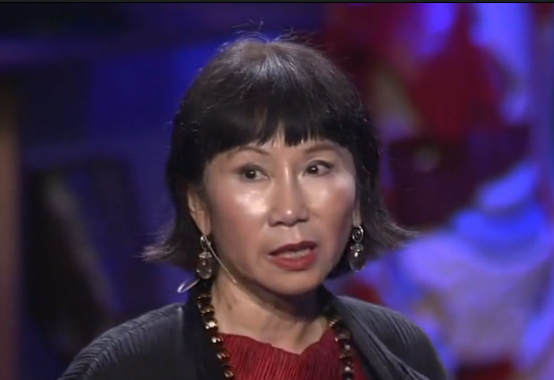A big thing that I also think about is accidents.
我也時常想到意外。
And as I said, my mother did not believe in randomness. What is the nature of accidents?
如我所說,我母親從不相信偶然。那意外又是什么?
And how are we going to assign what the responsibility and the causes are, outside of a court of law?
對于那些法律以外的事件,我們又該如何處理面對它們的責任歸屬?
I was able to see that in a firsthand way, when I went to beautiful Dong village, in Guizhou, the poorest province of China.
我有一個切身的經驗,我曾經到中國最貧窮的貴州省里的侗族。
And I saw this beautiful place. I knew I wanted to come back.
我看見這個美麗的地方。我知道我想再回來。
And I had a chance to do that, when National Geographic asked me if I wanted to write anything about China.
當《國家地理》雜志問我想不想寫一些有關中國的文章,我知道我的機會來了。
And I said yes, about this village of singing people, singing minority.
我說好,我想寫這個唱歌的少數民族。
And they agreed, and between the time I saw this place and the next time I went, there was a terrible accident.
它們同意了,就在我兩次拜訪中間,一個悲慘的意外發生了。

A man, an old man, fell asleep, and his quilt dropped in a pan of fire that kept him warm.
一個老人在睡眠中把被子掉在了暖爐上。
60 homes were destroyed, and 40 were damaged. Responsibility was assigned to the family.
六十戶人家全毀,四十戶遭到損壞。這個家庭得擔負責任。
The man's sons were banished to live three kilometers away, in a cowshed.
老人的兒子被放逐到三公里外的牛棚。
And, of course, as Westerners, we say, "Well, it was an accident. That's not fair. It's the son, not the father."
西方人會說:“但那是個不過是個意外,這不公平。父債不該子還。”
When I go on a story, I have to let go of those kinds of beliefs.
但當我下筆寫這個故事的時候,我得放棄那些原來的想法。
It takes a while, but I have to let go of them and just go there, and be there.
這得花上一些時間,但是我必須克服自己,純粹得去那里親身經歷。
And so I was there on three occasions, different seasons.
所以我在不同的季節里去了三次。
And I began to sense something different about the history,
在這個貧窮的村莊里,我開始對歷史,
and what had happened before, and the nature of life in a very poor village,
之前發生的事件和人生的本質有了不同的感受,
and what you find as your joys, and your rituals, your traditions, your links with other families.
什么是讓你感到快樂的,你的儀式,你的傳統,我們和其他家庭產生關系的方式。
And I saw how this had a kind of justice, in its responsibility.
我開始明白這樣的責任歸屬中,有它自己的正義。
I was able to find out also about the ceremony that they were using, a ceremony they hadn't used in about 29 years.
我也開始了解他們使用的儀式。一個二十九年沒用過的儀式。
And it was to send some men -- a Feng Shui master sent men down to the underworld on ghost horses.
讓一個風水師送一些人乘著鬼馬進陰間。
Now you, as Westerners, and I, as Westerners, would say well, that's superstition.
你,身為一個西方人,如我,身為一個西方人,會說:那不過是迷信。
But after being there for a while, and seeing the amazing things that happened,
但在那里待了一段時間以后,親眼見識到這些神奇的事,
you begin to wonder whose beliefs are those that are in operation in the world, determining how things happen.
你開始想,究竟是誰的信仰運作在這個世界上,決定事情該如何發生。











